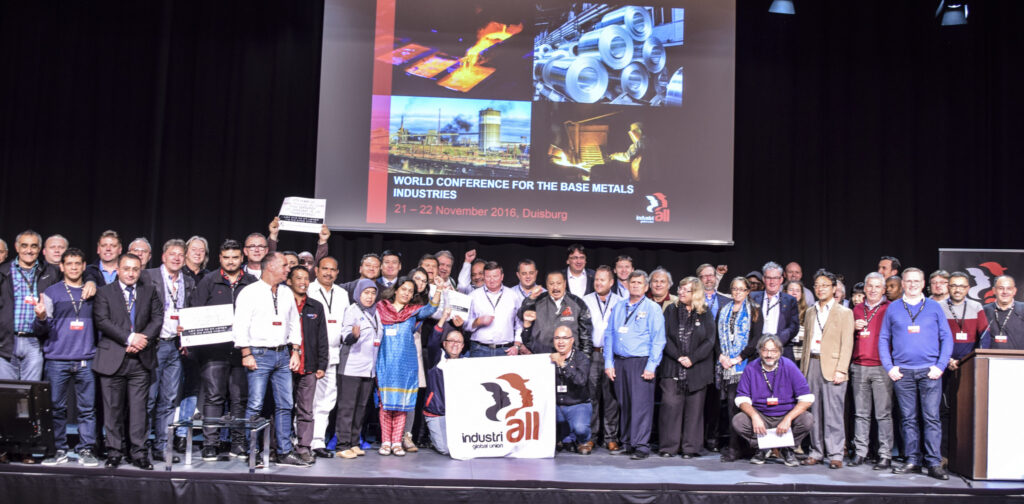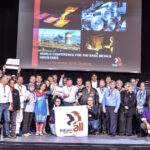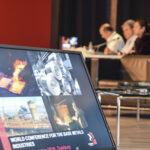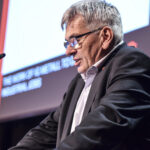24 November, 2016Some 100 delegates from 32 unions in 24 countries organizing in the base metals industries met in Duisburg, Germany, to develop an action plan to tackle the crisis in the industry.
IndustriALL Global Union general secretary Valter Sanches stressed that Duisburg, in the industrially important Ruhr area, was an important symbolic choice of meeting place: a major steel city that had seen a decline in the industry, and managed a Just Transition.
Delegates were welcomed by mayor Sören Link:
“We thought our fires would never go out, but they burned low, and we lost many thousands of jobs. With innovation and commitment, we have been able to transform our city.”
Two issues overshadowed the conference: the election of Donald Trump as president of the United States, and the overcapacity in the steel market due to Chinese dumping.
Valter Sanches said:
“We have political polarization and the rise of the populist right: Trump and Brexit, the coup in Brazil, and worrying signs for the next election in France.
“We need to build the strength and unity of our unions to face this threat.”
The conference discussed a powerful declaration on the global steel crisis. Steel is the world’s second largest industry, and has driven 100 years of industrial development. Many other industries depend on it, and steel consumption is projected to increase.
And yet the industry is in its worst crisis in a generation. Chinese steel production, with state support, has increased five fold in 15 years. As the Chinese economy slows and domestic demand weakens, excess steel is being dumped on the world market, severely distorting it, and creating a crisis of sustainability in the industry.
The declaration calls on global institutions and governments to develop strategies to prevent dumping. China should not be granted market economy status while it refuses to play by global rules.
The declaration also notes that Chinese workers suffer from the economic contraction, and calls on China to allow free trade unions. Instead of a downward spiral of unfair competition, the declaration calls for massive investment in infrastructure and in training, so that the industry can meet the demands of the future.
Section co-chair Thomas Conway of the United Steelworkers was clear:
“State support for Chinese producers means they are able to sell steel at below cost. This distorts the market. There is a fundamental overcapacity, and we are losing thousands of jobs as a result.”
In a powerful sessions about how strong unions are able to bring about change, Jörg Hofmann, president of IndustriALL and IG Metall, spoke about how IG Metall have defended jobs in the base metals sector.
He stressed the importance of well organized, strong unions being in a good bargaining position to work with employers to manage changes to the sector.
The solution is to embrace innovation and the rising productivity it brings. Unions should fight for industrial investment and vocational training to provide new jobs for highly skilled workers.
“A powerful union can influence policy and co-determine the future of the sector.
“Innovation is key. It's a golden opportunity. And it needs qualified labour. Vocational training is very important.”
“We need stable and rock solid union organizations. There are challenges ahead."
The importance of having a strong bargaining position internationally was reinforced in a session on global framework agreements introduced by assistant general secretary Kemal Özkan.
“These are not just paper agreements: workers' rights are a red line. And creating trade union networks is the key to building that strength internationally.”
The conference adopted an action plan calling for unity in the face of the challenges ahead, and commitments to fight precarious work and for a Just Transition. The plan involves strengthening trade union networks, and calls on the base metals sector to work more closely with the mining sector to develop better coverage of the supply chain.
Unions will lobby international institutions for a just global framework on steel producers, free of market distortions.
Thomas Conway and Sanjyot Vadhavkar of SMEFI in India were elected co-chairs for the next four-year period.
To see photos from the conference, please go to our flickr page.








